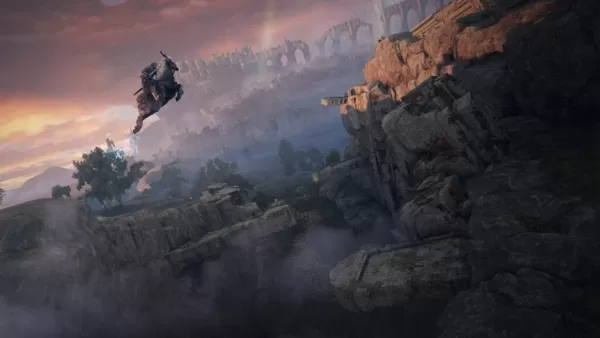Open-world games have traditionally been dominated by a focus on completing checklists, with maps littered with markers, mini-maps directing your every move, and objectives that often felt more like tasks than adventures. However, the arrival of Elden Ring by FromSoftware changed the landscape, discarding conventional guidelines and minimizing guidance, offering players an unparalleled sense of true freedom.
In collaboration with Eneba, we delve into the impact Elden Ring has had on the genre and why it deserves your admiration.
A World That Doesn’t Beg for Your Attention
Unlike most open-world games that vie for your constant attention with incessant notifications about where to go and what to do, Elden Ring adopts a more subtle approach. It presents a vast, enigmatic world and encourages you to explore it at your own pace. The absence of intrusive user interface elements means your curiosity becomes your compass. If something piques your interest on the horizon, venture towards it. You might discover a concealed dungeon, a formidable weapon, or a monstrous boss ready to challenge you.
One of the standout features is the lack of level scaling. The world remains static, forcing you to adapt to it. Encountering a particularly tough area? You can return later, better prepared, or take on the challenge immediately. The choice is yours, even if it means facing a dragon at level five with a broken sword—just don't expect to walk away unscathed.
It's never too late to delve into the Lands Between, especially when you can find an Elden Ring Steam key at a surprisingly affordable price on Eneba.
Exploration Feels Like Discovery, Not a Checklist
In typical open-world games, exploration often revolves around efficiency, rushing from one marker to the next, treating objectives as mere errands. Elden Ring revolutionizes this by eliminating the quest log and providing no explicit directions. NPCs communicate in enigmas, distant landmarks appear without context, and the game refrains from spoon-feeding information.
While this might seem daunting, it's what makes exploration so gratifying. Each cave, ruin, and fortress feels like a personal discovery. You venture there out of curiosity, not because you were instructed to. Furthermore, the rewards in Elden Ring are meaningful. Unearth a hidden cave, and you could emerge with a weapon that alters your gameplay or a spell capable of summoning a meteor storm.

The Joy of Getting Lost (and Surviving)
In many games, getting lost is considered a setback. In Elden Ring, it's an integral part of the experience. You might mistakenly wander into a poison swamp or stumble upon a seemingly tranquil village only to be ambushed by grotesque creatures. These unexpected encounters breathe life into the world.
While the game doesn't hold your hand, it does scatter subtle clues throughout the environment. A statue might hint at an underground treasure, or a cryptic NPC could allude to a hidden boss. By paying attention, you can navigate the world without being forced onto a predetermined path.
Open-World Games Will Never Be the Same?
Elden Ring has set a new standard for open-world games, demonstrating that players crave mystery, challenge, and the thrill of discovery over constant guidance. FromSoftware's approach has shown that less can indeed be more, and we can only hope that other developers will follow suit.
If you're eager to immerse yourself in a world that not only invites but demands exploration, digital marketplaces like Eneba offer incredible deals on gaming essentials. Whether it's Elden Ring or other must-play titles, your next adventure is just a few clicks away.




















